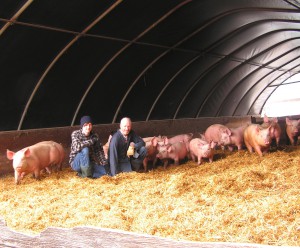 The economic pressures faced by small-scale pig producers have caused many to quit the business, unable to compete with larger, more cost efficient operations. The alternative is to look for a niche market opportunity to add value to the pork in order to remain profitable. Two years ago, George and Shelley Matheson, of Stonewall, Manitoba decided to downsize their 100-sow unit and focus on developing retail sales of “natural” pork. Being only half an hour from Winnipeg, with 600,000 potential customers, they saw an opportunity to capitalize on the increasing interest in how food is produced. “When you sell direct to the public and people come to the farm, they are very interested in how the pigs are reared, the diets we are using, the ages of the pigs and the breeds,” George explains.
The economic pressures faced by small-scale pig producers have caused many to quit the business, unable to compete with larger, more cost efficient operations. The alternative is to look for a niche market opportunity to add value to the pork in order to remain profitable. Two years ago, George and Shelley Matheson, of Stonewall, Manitoba decided to downsize their 100-sow unit and focus on developing retail sales of “natural” pork. Being only half an hour from Winnipeg, with 600,000 potential customers, they saw an opportunity to capitalize on the increasing interest in how food is produced. “When you sell direct to the public and people come to the farm, they are very interested in how the pigs are reared, the diets we are using, the ages of the pigs and the breeds,” George explains.
Although there is no official definition of “natural”, the Mathesons believe that it means operating a production system where pigs can fulfil their natural behaviour and are fed simple rations made on the farm from homegrown cereals. Sows are kept outside all the year round and have small sheds with deep straw to keep warm in the winter. They go indoors into conventional crates to farrow and, after weaning, the piglets stay inside until they are 50lbs, when they move into biotech barns with deep straw bedding. Although most of the finished hogs are still sold into the commodity market, eight per month go to Interlake Packers at St. Laurent. There they are custom killed, butchered into retail sized cuts, the hams and bacon smoked and everything vacuum packed. “We sell quarter, half or whole hog packs with 33, 66 or 132 pounds of pork and each has nine different cuts,” says George. “Good packing ensures the product will last at least a year.”
With many customers coming to the farm to collect the pork, the Mathesons are keen to show them the animals and explain how they are produced. “People are detached from agriculture these days, so they really enjoy seeing what we are doing and are very interested,” George explains. “They see the pigs outside or on deep straw and they like it.” The Matheson also rear 1000 chickens on pasture each year, during the summer and say they are so popular, they could easily sell 10,000. “People tell us that the taste is very different from mass produced chickens,” says George.
In addition to selling directly from the farm, the Mathesons attend farmers’ markets and produce markets in the area. They recently participated in a seminar on buying food locally, which was attended by 140 people and try to attend as many local food-related events as possible. “Shelley is the marketing guru and has produced a leaflet on our products and is working on a website,” George says. “We want to increase the pork sales and eventually be able to sell all our pigs direct to the public.” He believes that adding value in this way and producing feed from grain produced on the farm can be profitable. “We can definitely improve our marketing and Shelley has a good way of making our products sound attractive.”
 The Matheson’s four children are also involved on the farm on a daily basis. “They all have their chores to do and this gives them an exposure to farming life, says George. “Most kids don’t know that the little pigs grow up so quickly and become pork and bacon!” The children also help out showing visitors the animals and go to the farmers’ markets.
The Matheson’s four children are also involved on the farm on a daily basis. “They all have their chores to do and this gives them an exposure to farming life, says George. “Most kids don’t know that the little pigs grow up so quickly and become pork and bacon!” The children also help out showing visitors the animals and go to the farmers’ markets.
With the mainstream pork industry in such dire straights, selling direct to the public is an attractive option for some small producers, despite the additional work involved. It has an added benefit for the industry at large through helping the public understand livestock rearing methods and letting them talk directly to the people producing their food.
Photo captions:
Hannah Matheson – The Mathesons’ youngest daughter, Hannah, who helps with chores on the farm
Biotech pigs – George Matheson (right) and his son Austin with pigs in one of the biotech shelters









